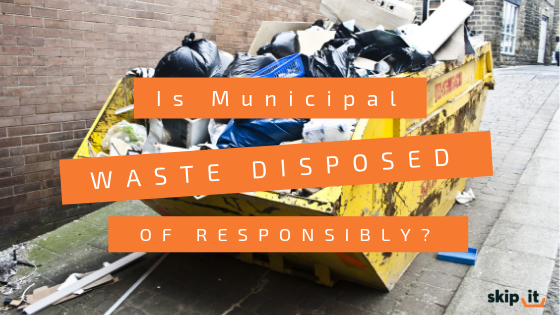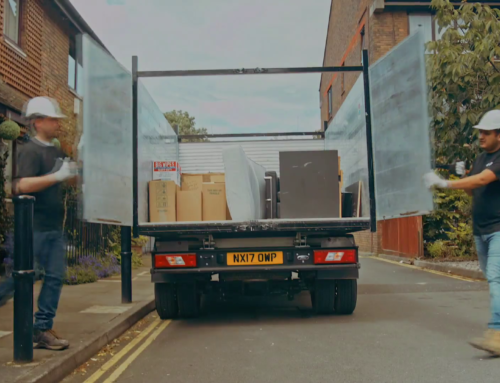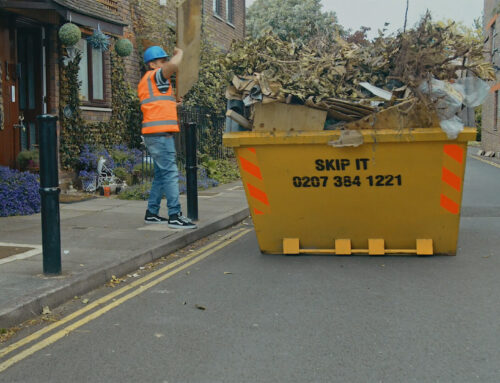Municipal waste is a common term used to define everyday waste that is produced by the general public. It is an inevitable result of our lifestyles, but the scale at which it is produced causes problems in the management process of waste removal, destroying our environment and planet.
Here is a definition of municipal waste and the management issues that come with it. Discover how Skip It can help you remove waste and recycle responsibly while respecting the environment at the same time.
What is municipal waste?
Municipal waste, also known as municipal solid waste (MSW), is a type of waste produced and discarded by the public on a daily basis. It is commonly known as rubbish and refers to waste that is collected or managed by municipal authorities, meaning the local councils. This means that there are public statistics available about how much household waste is produced.
The waste stream mainly consists of everyday items, including plastic film and packaging materials, and originates from households. Sources of wastes from offices, public institutions and specific municipal services may also be found in this stream.
What are the different types of waste?
- Biodegradable waste: Kitchen waste, including food and green waste
- Recyclable materials: Paper, glass, bottles, metals, certain plastics, clothes, batteries, etc.
- Toxic materials: Pesticides, herbicides and fungicides
- Electrical waste: Light bulbs, washing machines, TVs, computers, mobile phones, etc.
- Hazardous waste: Chemicals, electrical appliances, batteries, aerosol spray cans, etc.
What is the municipal waste management process?
All waste streams have different approaches to disposal depending on their contents. The municipal waste industry has four ways of disposing and removing: Recycling, composting, disposing or waste-to-energy.
The first part of the removal process is the collection of municipal waste. This includes the transportation of the waste material to a processing facility or landfill disposal site, where the vehicle is emptied.
The next step is separating the different types of waste components and then placing them in storage containers, ready for collection.
Unfortunately, most solid waste, including residential, compost and residual waste from materials recovery and combustion facilities, are disposed in landfill sites. However, modern sanitary landfills make sure the masses of waste does not threaten the public health and safety.
In recent years, environmental organisations have been working to reduce the landfill volume by re-using and recycling as much waste as possible. Municipal waste has also been used to generate energy via the waste-to-energy strategy. Technologies are developing more economical and cleaner energy generation methods, such as landfill gas captures and combustion. This produces energy in the form of electricity and heat or processes waste into fuel sources, all from municipal waste.
The recycling issues of municipal waste
While these innovative methods have significantly reduced the mass production of pollutants, it has been revealed by the Environment Agency (EA) that the UK’s plastic waste is being transported and sent to landfills abroad, polluting oceans and rivers.
Widespread corruption and fraud have been detected in the recycling export industry and about six UK plastic waste exporting businesses had their licenses removed in August 2018.
The UK’s recycling export industry was accused of having illegally shipped plastic waste overseas via the Netherlands to countries such as China. Moreover, plastic waste that was meant to be recycled was instead dumped in rivers and oceans.
In January 2018, China began refusing the UK’s plastic waste which led to the government shipping it to Poland, Vietnam and Malaysia, and searching for other countries that were willing to accept these shipments.
This kind of corruption continues to do damage to our environment which can severely backfire on the human population centuries or even decades into the future. However, you can make a start, by choosing waste disposal companies that care for our planet.
Here at Skip It we work closely with verified and accredited recycling companies and ensure that your waste is being disposed of and recycled responsibly. In fact, Skip It recycles 95 per cent of all waste collected from our customers, whether it is through our Skip Hire, House Clearance, or Wait & Load services.
You can trust us in our commitment to reduce the amount of waste entering landfill sites and recycling as much waste as we can, without polluting our planet. Contact us to find out more about our drive to save the environment and book the waste removal service that suits you today!









Leave A Comment